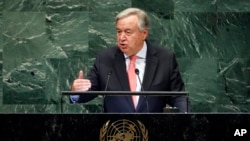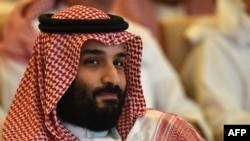U.N. Secretary-General Antonio Guterres has appealed to G-20 leaders ahead of their meetings this week to cooperate more to address some of the planet's most pressing issues.
"Threats to human prosperity are becoming increasingly acute," Guterres wrote in a five-page letter dated Nov. 16 and released by the U.N. on Wednesday. "More, rather than less, cooperation is needed," he said.
Guterres detailed threats from global hunger to climate-related disasters to the need for empowering women and harnessing technology for good. He said multilateralism must be "preserved and renewed," and he urged international support for the U.N.'s Sustainable Development Goals (SDGs), which he said "provide us with an agreed blueprint to tackle the most daunting challenges of our times."
Watch: What is the G-20?
The U.N. General Assembly adopted the SDGs in 2015. The 17 global goals provide a framework for ending extreme poverty and hunger, improving health and education, and protecting the planet, all by 2030.
"I hope leaders at the G-20 will give it a strong push forward," Guterres told reporters ahead of his departure for the summit in Argentina.
The U.N. chief is also grappling with a series of international crises and conflicts. At the top of the list is the nearly four-year-old war in Yemen that has left half that nation —14 million people— on the brink of starvation.
"We are at a very crucial moment in relation to Yemen," Guterres said in response to reporters' questions. "I believe there is a chance to be able to start effective negotiations in Sweden early in December, but we are not yet there."
His special envoy, Martin Griffiths, has been shuttling around the region talking to key players and trying to get them to the negotiating table in Sweden.Saudi Arabia, which leads the pro-government coalition bombing the Iranian-backed Houthi rebels in Yemen, will be represented at the G20 by Crown Prince Mohammed Bin Salman. Asked if he would meet with the prince, who has come under international scrutiny for his possible role in the brutal murder of a Saudi dissident journalist, Guterres said he is ready to meet him.
"I'm ready to discuss it with the crown prince or with any other Saudi officials, because I believe it is a very important objective at the present moment," Guterres said. "If we are able to stop the Yemeni war, we will be stopping the most tragic humanitarian disaster we are facing in today's world."
Climate calls
The U.N. chief also made a big pitch for action on climate change.
"Climate action can no longer wait," he wrote. "Decisive action to halt the progress of climate change is imperative."
In 2015, leaders made ambitious commitments under the Paris Agreement to mitigate the effects of climate change and adapt to its effects. China and the United States — the world's two biggest emitters of greenhouse gases — both joined the deal, but the U.S. under the Trump administration announced its intention to withdraw.
"The members of the G20 are responsible for more than three-quarters of greenhouse emissions," Guterres told reporters. "Yet, it is equally true that G20 members have the power to bend the emissions curve. They also have the resources to provide the financing needed for both mitigation and adaptation," he added.
The U.N. chief has insisted that greening the global economy will be good for everyone, creating jobs and investment opportunities.
After the G20, Guterres will travel to Katowice, Poland, for the Conference of the Parties (COP 24) to the Paris accord.








